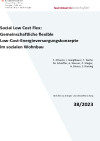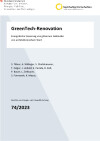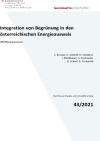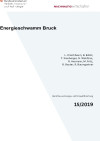Suchergebnisse
Social Low Cost Flex: Gemeinschaftliche flexible Low-Cost- Energieversorgungskonzepte im sozialen Wohnbau

Ziel des Projekts war die Erarbeitung von Konzepten für gemeinschaftliche Erzeugungsanlagen bzw. lokale Energiegemeinschaften in sozialen Wohnbauten sowie die Entwicklung von Low-Cost Ansätzen, um vorhandene thermische und elektrische Flexibilitäten mit minimal invasiven Eingriffen für das Stromsystem zu aktivieren und zur Steigerung des Eigenverbrauchs im Wohnbau bzw. Quartier, aber auch im Sinne des Gesamtsystems zu nutzen. Ergebnis des Projekts sind auf ihre Realisierbarkeit geprüfte Low Cost Konzepte und Geschäftsmodelle zur Umsetzung von gemeinschaftlichen Energieerzeugungs- und –nutzungskonzepten im sozialen Wohnbau.
Schriftenreihe
38/2023
F. Ettwein, J. Ganglbauer, T. Nacht, M. Schloffer, A. Werner, P. Stieger, H. Bieser, S. Raming
Herausgeber: BMK
Deutsch, 37 Seiten
Downloads zur Publikation
GreenTech-Renovation - Energetische Sanierung von gläsernen Gebäuden von architektonischem Wert

Der Schwerpunkt des Projekts GreenTech-Renovation war, innovative Lösungen zur energetischen Sanierung von architektonisch wertvollen Bauten mit hohen Glasanteil zu finden. Dafür wurde ein zukunftsweisendes bauphysikalisches Konzept entwickelt, das den Einsatz alternativer Energieformen beinhaltet. Ein intelligentes Nutzungskonzept kann mit ökologischem und sozialem Engagement die energetischen Sanierungskonzepte verstärken und deren Nachhaltigkeit garantieren. Die 10-R der Kreislaufwirtschaft (Refuse, Rethink, Reduce, Reuse, Repair, Refurbish, Remanufacture, Repurpose, Recycle, Recover) dienen dabei als Leitlinie.
Schriftenreihe
74/2023
S. Tillner, A. Willinger, S. Stockhammer, T. Zelger, J. Leibold, E. Paráda, D. Bell, P. Bauer, L. Zeilbauer, S. Formanek, K. Mauss, B. Lipp, T. Dobra
Herausgeber: BMK
Deutsch, 152 Seiten
Downloads zur Publikation
Integration von Begrünung in den österreichischen Energieausweis (GREENergieausweis)

Anpassung der Berechnungsmodelle im Energieausweis derart, dass Gebäudebegrünung darin möglichst realistisch abgebildet werden kann und Abschätzung zur Akzeptanz einer Umsetzung bei relevanten Stakeholdern.
Schriftenreihe
43/2021
C. Kresser, E. Schriefl, H. Schöberl, I. Mühlbauer, S. Formanek, B. Scharf, G. Frühwirth
Herausgeber: BMK
Deutsch, 71 Seiten
Downloads zur Publikation
Technologiereport: Digitalisierung der Bau- und Immobilienbranche
In der Vielzahl digitaler Möglichkeiten ist es nur sehr schwer möglich, einen Überblick zu behalten, Trends und Potentiale abzuschätzen sowie Zusammenhänge zu erkennen. Der vorliegende Report zielt daher darauf ab, den aktuellen Stand der Technik und die Markteinschätzung vielversprechender digitaler Technologien zu beschreiben. Es werden Informationen über konkrete Anwendungsfälle, Mehrwert und Herausforderungen der jeweiligen Technologien bereitgestellt. Die dargestellten Analysen dienen der Potentialbewertung und der strategischen Weichenstellung zur Integration der aktuell wichtigsten digitalen Technologien der Bau- und Immobilienbranche.
Energieschwamm Bruck

Im Sondierungsprojekt für die Stadtregion Bruck/Oberaich "Energieschwamm Bruck" wurden klare Grundlagen zur Entwicklung und Flexibilisierung des zukünftigen kommunalen Energiesystems in Form eines Energieentwicklungskonzeptes und eines Katasters möglicher Umsetzungsprojekte erarbeitet. Aus dem für Bruck angewendeten, strukturellen Lösungsprozess wurde eine allgemein gültige Lösungsmethode für Städte mit 10.000-25.000 Einwohnern abgeleitet.
Schriftenreihe
15/2019
L. Kriechbaum, B. Böckl, T. Kienberger, N. Wohltran, R. Hermann, M. Fritz, R. Rauter, R. Baumgartner
Herausgeber: BMVIT
Deutsch, 62 Seiten
Downloads zur Publikation
DW² - Entwicklung einer thermisch verbesserten Schlitzwandkonstruktion
Die thermischen Eigenschaften von Schlitzwandkonstruktionen werden durch die Anwendung neuer Materialien und Herstellungsmethoden verbessert und durch Labor- und Feldversuche validiert sowie durch numerische und ökologische Betrachtungen ergänzt. Das Ergebnis kann bei der Errichtung von energetisch verbesserten unterirdischen Bauwerken wie beispielsweise Tiefgaragen oder zur Herstellung von Erdwärmespeichern verwendet werden.
DW² - Thermal improvements on diaphragm walls
New materials and installation methods for diaphragm walls will be investigated in laboratory and field tests in order to improve the thermal properties of the construction elements. Additional numerical and ecological aspects are considered to ensure an energetic enhancement of underground constructions such as underground garages or thermal energy storages.
HotCity - Gamification als Möglichkeit für die Generierung von Daten zur energieorientierten Quartiersplanung
Ziel des Projekts war ein Funktionstest, ob durch Gamification kosteneffizient, rasch und zuverlässig ein aktueller Datensatz von energierelevanten Daten zur Quartiersplanung erhoben werden kann. Dies wurde am Beispiel der Potenzialermittlung von industriellen und gewerblichen Abwärmequellen in Wien und Graz ermittelt.
HotCity - Gamification as a possibility to generate data for energy-oriented neighbourhood planning
The aim of the project was a functional test to determine whether an up-to-date data set of energy-oriented data can be collected for neighbourhood planning through gamification, cost-efficiently, quickly and reliably. This had been determined using the example of the potential determination of industrial and commercial waste heat sources in Vienna and Graz.
ParaSol - Multifunktionale solaraktive Platz- und Straßenüberdachung Leoben
Am Use Case Leoben wird erstmals an konkreten Orten ausgelotet, welche stadträumlichen Auswirkungen, Synergie- und Energiepotentiale neu zu entwickelnde, solaraktive Platz- und Straßenüberdachungen in Form von weitgespannten Konstruktionen in Leichtbauweise im öffentlichen urbanen Raum mit sich bringen und wie sie sich auf das Stadtbild und die Stadtfunktion auswirken.
ParaSol - Multifunctional solar canopies for urban streets and places
With the city of Leoben as a use case this exploratory project will, for the first time ever, examine the spatial effects, synergy- and energy potentials of newly developed wide-span light-weight solar canopies for streets and squares in urban public space as well as their implications on the townscape, the image of the city and the city function.
STP2030, St. Pölten 2030: KlimaNEUTRAL + KlimaFIT
Ein breit angelegter partizipatorischer Strategieprozess zur co-kreativen Erarbeitung der "Roadmap zur Klimaneutralität" St. Pöltens bis 2030. Die Roadmap fußt auf einer gemeinsam getragenen Vision, welche differenziert zu Transformationspfaden in unterschiedlichen Handlungsfeldern entwickelt wird. Im Ergebnis soll ein stadtgesellschaftliches "Klima des Wandels" entstehen, das der Basis für die Teilnahme an Ausschreibungen, Kooperation und Umsetzungen auf dem Weg in die Klimaneutralität dient.
STP2030, St. Pölten 2030: KlimaNEUTRAL + KlimaFIT
A broadly based, participatory strategy process for the co-creative development of the “Roadmap to Climate Neutrality” St. Pölten by 2030. The roadmap is based on a shared vision, which is differentiated into transformation paths in different fields of action. The result is a “climate of change” in urban society that serves as the basis for participation in tenders, cooperation and implementation on the way to climate neutrality.
BiBi-TGA - Potenzial der ökologischen Optimierung technischer Gebäudeausrüstung durch den Einsatz biogener Materialien
Erhebung des Substitutionspotenzials herkömmlicher Komponenten der technischen Gebäudeausrüstung durch biogene Materialien. Ziel war die Generierung neuer Daten zum ökologischen Verbesserungspotenzial des Einsatzes biogener Ressourcen in der technischen Gebäudeausrüstung in Bürogebäuden. Anhand von LCA-Screenings und Untersuchungen der technischen Umsetzbarkeit wurden die Potenziale analysiert.
BiBi-TGA, Potential for the ecological optimization of technical building equipment through the usage of biogenic materials
Assessment of the substitution potential of conventional components of technical building equipment by biogenic materials. The aim is to provide new data on the ecological improvement potential of the usage of biogenic resources in the technical building equipment in office buildings. The potentials are analyzed by means of LCA screenings and technical feasibility studies.
Multi-WP - Hocheffiziente multivalente Wärmepumpenkonzepte zur thermischen Nutzung von Außenluft mit geothermischer Speicherung
Optimierung von Multi-WP-Systemen bestehend aus Luft-Wärmepumpen und Erdspeichern im Hinblick auf Erhöhung der Flexibilität und Effizienz ab 30 kW für Einzelgebäude sowie Quartierslösungen und Behandlung von Aspekten wie PV-Nutzungsoptimierung, Betriebsweise, Nutzungskonflikte und Lärmbelastung durch Luftwärmepumpen. Das Projekt wird die Nutzung der Wärmequelle Außenluft in Kombination mit Saisonspeichern als besonders effiziente Alternative für Heizung, Kühlung und Warmwasserbereitung etablieren.
Multi-WP – High-efficiency multivalent heat pump concepts for the thermal use of external air with geothermal storage
Optimization of multi-WP systems consisting of air-source heat pumps and geothermal storage with regard to increasing flexibility and efficiency from 30 kW for individual buildings as well as neighbourhood solutions and addressing aspects such as PV utilization optimization, mode of operation, utilization conflicts and noise pollution from air-source heat pumps. The project will establish the use of the heat source external air in combination with seasonal storage as a particularly efficient alternative for heating, cooling and hot water supply.
VITALITY - Energieoptimierte Design-Regeln und Planungsschnittstellen für BIPV im urbanen Raum
Das Projekt VITALITY zielte darauf ab, unterstützende Instrumente, Designregeln und belastbare Informationen in der frühen Entscheidungs- und Entwurfsphase von Bauvorhaben zu liefern, um bauwerkintegrierte Photovoltaik (BIPV) einerseits in die Diskussion der Konzeptphase einzubringen und andererseits die Umsetzung stark vorzubereiten und zu unterstützen.
VITALITY - Energy optimised design rules and integral planning approach for building-integrated photovoltaics in urban areas
The VITALITY project aims to provide supporting tools, design rules and robust information in the early decision and design phase of building projects. By providing the right information at the right time, building-integrated photovoltaics (BIPV) is part of the discussion in the concept phase and the implementation is strongly prepared and supported.
FEELings - User Feedback for Energy Efficiency in Buildings
Der Energieverbrauch von Gebäuden wird maßgeblich durch das Verhalten von NutzerInnen beeinflusst. In diesem Forschungsprojekt wird ein neuartiges User-Feedbacksystem untersucht. NutzerInnen geben Feedback zur empfundenen Raumqualität. Auf Basis des Feedbacks werden Einstellungen an der Gebäudetechnik zur Energieeffizienz- und Komfortsteigerung optimiert. Der Proof-of-Concept für dieses neuartige System wird anhand von zwei Use-Cases erbracht.
